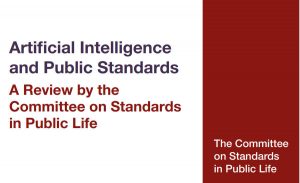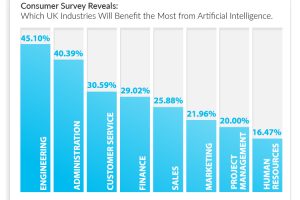
It sees no need for a Government AI regulator, but recommends (detail below) that government ensure high standards of conduct are upheld.
“Artificial intelligence, and in particular machine learning, will transform the way public sector organisations make decisions and deliver public services,” according to the Committee. “Adherence to high public standards will help fully realise the benefits of AI in public service delivery. By ensuring that AI is subject to appropriate safeguards and regulations, the public can have confidence that new technologies will be used in a way that upholds the ‘seven principles of public life’ [see below]. We concluded that the principles remain a valid guide for public sector practice as AI is deployed across government.”
These are also known as the Nolan Principles. Briefly, they are:
- selflessness
- integrity
- objectivity
- Accountability
- openness
- honesty
- leadership
“This review found that the Nolan Principles are strong, relevant, and do not need reformulating for AI,” according to the report ‘Artificial intelligence and public standards: A review by the Committee on Standards in Public Life‘ (free full dowload). “The Committee heard that they are principles of good governance that have stood, and continue to stand, the test of time. However, AI poses a challenge to three principles in particular: openness, accountability, and objectivity.”
The report is detailed and thoughtful, covering some 70 pages. Do read it if you are interested in the potential impact of AI.
Its recommendations are also detailed, and have been summarised by the committee:
Our message to government is that the UK’s regulatory and governance framework for AI in the public sector remains a work in progress and deficiencies are notable. The work of the Office for AI, the Alan Turing Institute, the Centre for Data Ethics and Innovation [CDEI], and the Information Commissioner’s Office [ICO] are all commendable. But on the issues of transparency and data bias in particular, there is an urgent need for guidance and regulation.
Regulators must also prepare for the changes AI will bring. We concluded that the UK does not need a new AI regulator, but that all regulators must adapt to the challenges that AI poses to their sectors. The Committee endorses the government’s intention to establish CDEI as an independent, statutory body that will advise government and regulators in this area.
Upholding public standards will also require action from public bodies using AI to deliver frontline services. All public bodies must comply with the law surrounding data-driven technology and implement clear, risk-based governance for their use of AI.
 Electronics Weekly Electronics Design & Components Tech News
Electronics Weekly Electronics Design & Components Tech News


